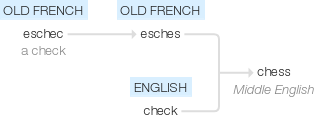Chess
Middle English: from Old French esches, plural of eschec ‘a check’ (see check1).
wiktionary
From Middle English ches, chesse, from Old French eschés, plural of eschec, from Medieval Latin scaccus, from Arabic شَاه (šāh, “king [in chess]”), from Persian شاه (šāh, “ shah, king”), from Middle Persian 𐭬𐭫𐭪𐭠 (mlkʾ/šāh/), from Old Persian 𐏋(XŠ/xšāyaθiya/).
Compare German Schach and Italian scacchi. Compare French échecs(“chess”) and its descendants: Catalan escacs and Dutch schaak. More at check and shah(“king of Persia or Iran”).
Origin uncertain; perhaps linked to Etymology 1, above, from the sense of being arranged in rows or lines.
Compare French châssis(“a framework of carpentry”).
etymonline
chess (n.)
very ancient game of skill with 32 pieces, played by two on a checkered board of 64 squares, 13c., from Old French esches "chessmen," plural of eschec "game of chess, chessboard; checkmate" (see check (n.1)), from the key move of the game. Modern French distinguishes échec "check, blow, rebuff, defeat," from plural échecs "chess."
The original word for "chess" is Sanskrit chaturanga "four members of an army" -- elephants, horses, chariots, foot soldiers. This is preserved in Spanish ajedrez, from Arabic (al) shat-ranj, from Persian chatrang, from the Sanskrit word.
The chess pieces are the block alphabet which shapes thoughts; and these thoughts, although making a visual design on the chessboard, express their beauty abstractly, like a poem. [Marcel Duchamp, address to New York State Chess Association, Aug. 30, 1952]
